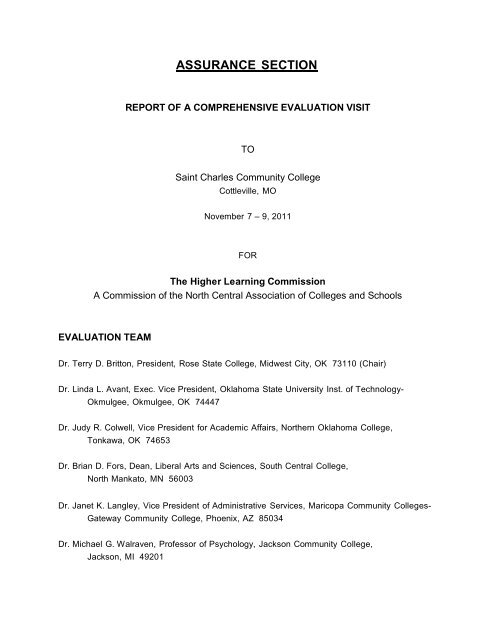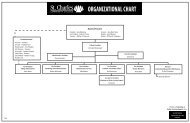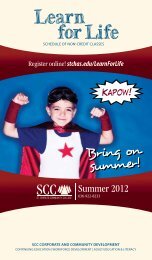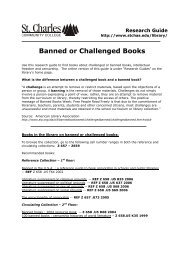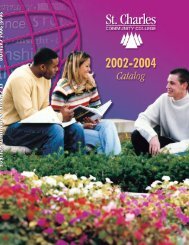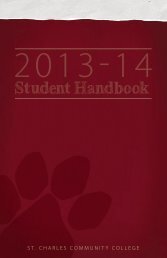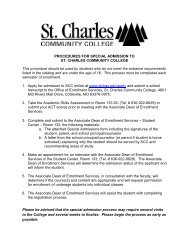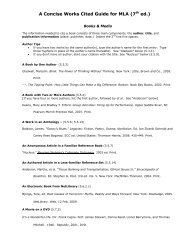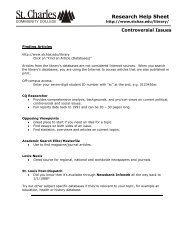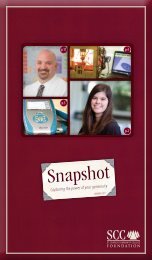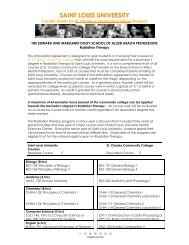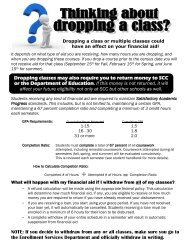HLC Comprehensive Evaluation Visit Report - St. Charles ...
HLC Comprehensive Evaluation Visit Report - St. Charles ...
HLC Comprehensive Evaluation Visit Report - St. Charles ...
- No tags were found...
You also want an ePaper? Increase the reach of your titles
YUMPU automatically turns print PDFs into web optimized ePapers that Google loves.
ASSURANCE SECTION<br />
REPORT OF A COMPREHENSIVE EVALUATION VISIT<br />
TO<br />
Saint <strong>Charles</strong> Community College<br />
Cottleville, MO<br />
November 7 – 9, 2011<br />
FOR<br />
The Higher Learning Commission<br />
A Commission of the North Central Association of Colleges and Schools<br />
EVALUATION TEAM<br />
Dr. Terry D. Britton, President, Rose <strong>St</strong>ate College, Midwest City, OK 73110 (Chair)<br />
Dr. Linda L. Avant, Exec. Vice President, Oklahoma <strong>St</strong>ate University Inst. of Technology-<br />
Okmulgee, Okmulgee, OK 74447<br />
Dr. Judy R. Colwell, Vice President for Academic Affairs, Northern Oklahoma College,<br />
Tonkawa, OK 74653<br />
Dr. Brian D. Fors, Dean, Liberal Arts and Sciences, South Central College,<br />
North Mankato, MN 56003<br />
Dr. Janet K. Langley, Vice President of Administrative Services, Maricopa Community Colleges-<br />
Gateway Community College, Phoenix, AZ 85034<br />
Dr. Michael G. Walraven, Professor of Psychology, Jackson Community College,<br />
Jackson, MI 49201
Assurance<br />
Saint <strong>Charles</strong> Community<br />
Contents<br />
I. Context and Nature of <strong>Visit</strong> ...................................................................................... 2<br />
II. Commitment to Peer Review .................................................................................. 6<br />
III. Compliance with Federal Requirements ................................................................ 6<br />
IV. Fulfillment of the Criteria........................................................................................ 6<br />
a. Criterion One ................................................................................................... 6<br />
b. Criterion Two ................................................................................................... 8<br />
c. Criterion Three .............................................................................................. 11<br />
d. Criterion Four ................................................................................................ 14<br />
e. Criterion Five ................................................................................................. 16<br />
V. Affiliation <strong>St</strong>atus ....................................................................................................... 18<br />
VI. Additional Comments and Explanations ................................................................. 19<br />
1 December 19, 2011
Assurance<br />
Saint <strong>Charles</strong> Community<br />
I. CONTEXT AND NATURE OF VISIT<br />
A. Purpose of <strong>Visit</strong><br />
The visit from November 7-9, 2011, was conducted as a comprehensive evaluation for<br />
continued accreditation at Saint <strong>Charles</strong> Community College (SCC), a comprehensive,<br />
public, two-year institution of higher education. A secondary request was to consider an<br />
embedded request to consider a recommendation to allow SCC to offer distance learning<br />
programs.<br />
B. Organizational Context<br />
Saint <strong>Charles</strong> Community College is located in Cottleville, Missouri. It was established in<br />
1986 with the first classes offered in 1987. The College serves approximately 8000<br />
credit students. SCC plays a central role in the community with credit programs,<br />
continuing education, work force development, college preparatory study, as well as<br />
enrichment activities ranging from wellness activities to cultural activities.<br />
C. Unique Aspects of <strong>Visit</strong><br />
The Team arrived for the visit 21 days after the third president of the College assumed<br />
his office.<br />
D. Sites or Branch Campuses <strong>Visit</strong>ed<br />
None<br />
E. Distance Education Reviewed<br />
The Team reviewed the Collegeʼs request to offer a variety of Associate Degree and<br />
Certificate Programs.<br />
F. Interactions with Constituencies<br />
The following list is indicative of the variety of conversations and meetings which took<br />
place during the visit.<br />
Individuals:<br />
President<br />
Vice President, Academic and <strong>St</strong>udent Affairs<br />
Vice President, Marketing and Communications<br />
Vice President, Technology, Research, and Planning<br />
Vice President, Human Resources<br />
Vice President, Administrative Services<br />
Associate Vice President, Foundation and Alumni Relations<br />
Director, Institutional Research and Effectiveness<br />
2 December 19, 2011
Assurance<br />
Saint <strong>Charles</strong> Community<br />
Director Academic Computing<br />
Director Financial Services<br />
Director Network Computing<br />
Director Administrative Computing<br />
Director of Facilities<br />
Associate Director of Facilities<br />
Maintenance Supervisor<br />
Interim Grounds Supervisor<br />
Housekeeping Supervisor<br />
Facilities Office Supervisor<br />
Associate Director, Institutional Research<br />
Dean, Corporate and Community Development<br />
Associate Dean, Corporate and Community Development<br />
Director of Workforce, Corporate and Community Development<br />
Project Coordinator, Corporate and Community Development<br />
Chief of Campus Police<br />
Associate Dean, Extended Learning<br />
Dean, <strong>St</strong>udent Development<br />
Dean of Enrollment Services<br />
Dean, Arts and Humanities<br />
ACE Services Center Director<br />
<strong>St</strong>udent Outreach Coordinator<br />
Associate Director, Marketing and Communications<br />
Professor, English<br />
Mathematics Professor, Achieving Success in Mathematics<br />
Mathematics Adjunct, Achieving Success in Mathematics<br />
Wellness Center Clerk<br />
Theater Ticket Office Clerk<br />
Groups:<br />
Board of Trustees (all members present)<br />
Self---<strong>St</strong>udy <strong>St</strong>eering Committee (17)<br />
Faculty (34)<br />
Human Resources Committee (15)<br />
Planning Council (13)<br />
Distance Learning Committee (10)<br />
<strong>St</strong>udent Group (10)<br />
Community Leaders Group (15)<br />
Non---Exempt <strong>St</strong>aff (70)<br />
ACE Center Tutors (2)<br />
Various Campus Police Officers<br />
Criterion 3 Committee (12)<br />
3 December 19, 2011
Assurance<br />
Saint <strong>Charles</strong> Community<br />
Professional/Administrative <strong>St</strong>aff (82)<br />
G. Principal Documents, Materials, and Web Pages Reviewed<br />
2011 Self---<strong>St</strong>udy <strong>Report</strong><br />
2002 NCA Team <strong>Evaluation</strong> <strong>Visit</strong> <strong>Report</strong><br />
College Catalog 2011---2012<br />
<strong>St</strong>udent Handbook 2011---2012<br />
Web Site Review<br />
SCC College Plan 2011---2012<br />
Room<br />
Audit <strong>Report</strong> June 30, 2011<br />
Financial <strong>St</strong>atements and Independent Auditors’ <strong>Report</strong> for 2010<br />
Preliminary and Fiscal Year Budgets (Board Minutes)<br />
Fall 2011 Faculty and Their Teaching Assignments<br />
Performance Horizons 2011<br />
<strong>St</strong>aff MOU’s with Administration<br />
Faculty MOU with Administration<br />
Faculty Handbook<br />
IPEDS Graduation Rates<br />
Board of Trustees Policies<br />
Learn for Life ( non---credit class schedule) Fall 2011<br />
Dual Enrollment Data for Self <strong>St</strong>udy 2011<br />
Annual <strong>Report</strong> 2010---2011<br />
Cougar News<br />
SCC <strong>St</strong>udent Inquiry Packet<br />
Achieving Success in Mathematics booklet<br />
Brand Positioning Workshop report<br />
C&CD Populations Served 2010---2011 <strong>Report</strong><br />
Kansas Cost <strong>St</strong>udy<br />
<strong>St</strong>aff Training and Education (STEP)<br />
Missouri <strong>St</strong>atewide General Education Policy<br />
Credit Transfer Guidelines…Among Missouri Colleges and Universities<br />
<strong>St</strong>udent Opinion Survey Results<br />
Enrollment and Retention Task force Year End <strong>Report</strong><br />
Multicultural Programming Flyers<br />
Sophomore Portfolio Assessments<br />
Career Technical Assessment <strong>Report</strong>s<br />
Graduate Survey Results<br />
Licensure Pass Rates<br />
General Education Assessment <strong>Report</strong> and Capstone Assessment<br />
Various Departmental Assessment <strong>Report</strong>s<br />
Distance Learning Success Rates<br />
4 December 19, 2011
Assurance<br />
Saint <strong>Charles</strong> Community<br />
Distance Learning Long---Range Plan Task Force <strong>Report</strong><br />
<strong>St</strong>udent Activities Policies and Procedures<br />
Intellectual Property Rights MOU<br />
Copyright Policies<br />
Mission <strong>St</strong>atement History and related documents<br />
Performance Horizon Surveys<br />
National Community College Benchmark Project<br />
Balanced Scorecard for Key Performance Indicators (KPI)<br />
Environmental Scan<br />
TEAMVision Committee Information and Webpage<br />
Faculty and <strong>St</strong>aff Mini---Grants: FY 2010---2011 Overview<br />
SCC College---Wide Plans 2010---2011<br />
Specialized Plans (Various)<br />
Critical Issues Change Documentation<br />
MCHE Facilities Review 2009<br />
SCC Financial Dashboard<br />
Faculty and <strong>St</strong>aff New Positions<br />
Employee Assistance Program<br />
Designation of Licensed Police Officers<br />
SCC Security Audit Findings (Technology)<br />
Summary of Sustainability Accomplishments<br />
Behavioral Intervention Team Flyer<br />
Enrollment Task Force <strong>Report</strong> to Cabinet<br />
Event Listing <strong>Report</strong><br />
List of Employee Involvement in Organizations<br />
College Branding Project<br />
<strong>St</strong>udent Inquiry Packet Web Page<br />
C&CD Course <strong>Evaluation</strong><br />
Lumens Learn for Life Website<br />
C&CD Plan for 2011/12<br />
Articulation Agreements<br />
Robotics Challenge<br />
Course Approval Form and Syllabus Guidelines<br />
Curriculum Committee Charter and Procedures<br />
<strong>St</strong>ate Faculty Survey Results<br />
Institutional Snapshot 5: Faculty Demography<br />
<strong>St</strong>udent to Faculty Ration: IPEDS <strong>Report</strong><br />
Faculty In---Service Agendas and various Professional Development Documents<br />
Assessment Results in English, Math, and Developmental Classes<br />
Budgeting Priorities<br />
Numerous and Various other documents and websites supporting Criteria.<br />
5 December 19, 2011
Assurance<br />
Saint <strong>Charles</strong> Community<br />
II. COMMITMENT TO PEER REVIEW<br />
A. <strong>Comprehensive</strong>ness of the Self-<strong>St</strong>udy Process<br />
The self-study process afforded opportunities for all constituents of the College to be<br />
involved in the comprehensive institutional review that is reflected in the self-study<br />
document and confirmed by the Team during the visit to the campus.<br />
B. Integrity of the Self-<strong>St</strong>udy <strong>Report</strong><br />
The self-study report is an accurate account of Saint <strong>Charles</strong> Community College. The<br />
College has adequately reported the state of the College, identifying strengths,<br />
concerns, and strategies to improve.<br />
C. Adequacy of Progress in Addressing Previously Identified Challenges<br />
The institution has responded to challenges identified in the 2002 Team <strong>Report</strong>. A<br />
progress report on strategic planning was prepared for the Commission and accepted.<br />
Other issues were addressed and documented in the self-study for Team review and<br />
verification.<br />
D. Notification of <strong>Evaluation</strong> <strong>Visit</strong> and Solicitation of Third-Party Comment<br />
The Team confirmed that Saint <strong>Charles</strong> Community College invited public comment on<br />
its website and in local newspapers prior to the accreditation visit. No third-party<br />
comments were received by the Higher Learning Commission. The institution fulfilled<br />
the requirement to seek such comment.<br />
III. COMPLIANCE WITH FEDERAL REQUIREMENTS<br />
The College documented compliance with federal requirements in the self-study report and<br />
provided additional documentation in the resource room. Team members reviewed the<br />
required Title IV compliance areas and student complaint information. All materials were in<br />
order and no area of concern was noted.<br />
IV. FULFILLMENT OF THE CRITERIA<br />
CRITERION ONE: MISSION AND INTEGRITY. The organization operates with integrity to<br />
ensure the fulfillment of its mission through structures and processes that involve the board,<br />
administration, faculty, staff, and students.<br />
1. Evidence that Core Components are met<br />
6 December 19, 2011
Assurance<br />
Saint <strong>Charles</strong> Community<br />
A. The Board has adopted statements of Mission, Vision, and Values, which clearly<br />
define the mission and purposes of the college, the constituents the college intends<br />
to serve, and the goals expected to be achieved by the students. By examination of<br />
documents and individual and group interviews, the team confirmed the process of<br />
mission development and the widespread display and publication of these<br />
documents. Accordingly, the organizationʼs purposes and values are clearly<br />
communicated.<br />
B. The mission documents commit the college to preparing students for success in a<br />
global society. In numerous interviews and meetings, the team confirmed the<br />
collegeʼs commitment to helping students achieve a deep understanding of and<br />
appreciation for the diversity of people on many dimensions. <strong>St</strong>udents of SCC are<br />
well served by the cogency and comprehensiveness of the Collegeʼs commitment.<br />
C. Throughout the visit, the team was impressed by the consistency of focus on the<br />
mission, vision, and values. In virtually all interviews and meetings, it was clear that<br />
planning, budgeting, recruitment, assignment, supervision, instruction, and<br />
evaluation, all conform to the mission, vision, and values the College has adopted<br />
and promulgated.<br />
D. While the Collegeʼs governance and administrative functions, as well as its overall<br />
organization, are those traditionally found in higher education, the team observed<br />
that the distribution and delegation of authority enable the College to focus its<br />
resources on the commitment of employees in all areas on the achievement of the<br />
mission and realization of the values. As growth slows, this strategy will serve SCC<br />
well as it continues focus on the success of students.<br />
E. In all its dealings with the College, from the Board of Trustees through all segments of<br />
faculty, staff, and administration, the team found invariable congruency between<br />
behavior and stated objectives and values. This consistent evidence of integrity<br />
serves the College well, enables the realization of the value of trust, and<br />
synergistically maintains open communication. These values, in turn, promote the<br />
level of teamwork which characterizes this organization, and support eagerness both<br />
to learn and to innovate.<br />
2. Evidence that one or more specified Core Components need organizational<br />
attention<br />
None<br />
3. Evidence that one or more specified Core Components require Commission<br />
7 December 19, 2011
Assurance<br />
Saint <strong>Charles</strong> Community<br />
follow-up.<br />
None<br />
4. Evidence that one or more specified Core Components are not met and<br />
require Commission follow-up. (Sanction or adverse action may be warranted.)<br />
None<br />
Recommendation of the Team<br />
Criterion is met; no commission follow-up recommended.<br />
CRITERION TWO: PREPARING FOR THE FUTURE. The organizationʼs allocation of<br />
resources and its processes for evaluation and planning demonstrate its capacity to fulfill its<br />
mission, improve the quality of its education, and respond to future challenges and<br />
opportunities.<br />
Evidence that Core Components are met<br />
A. The Collegeʼs strategic planning processes are built upon and reflect the Collegeʼs<br />
Mission, Vision, and Values. Annually, the Collegeʼs Planning Council reviews and<br />
updates Critical Issues, Goals, <strong>St</strong>rategic Organizational Objectives, and Key<br />
Performance Indicators which are then distributed to the various units (departments<br />
and divisions) and areas (groups of divisions and departments) for short and long<br />
term planning. College units and areas review prior year achievements and other<br />
data which then help inform their goals, objectives, and anticipated resource<br />
requirements. Recommendations regarding goals and objectives and related budget<br />
requests are advanced through the respective Vice President to the Presidentʼs<br />
Cabinet for evaluation and allocation of resources.<br />
B. Discussions with Planning Council members, other department college personnel and<br />
review of data confirm the variety of tools used throughout the strategic planning<br />
process. Such tools include the following: National Community College Benchmark<br />
Project; Kansas Cost <strong>St</strong>udy; Cougar Count Fact Book; Performance Horizon<br />
Employee Survey; <strong>St</strong>udent Opinion Survey; <strong>St</strong>. <strong>Charles</strong> Community College<br />
Environmental Scan; Balanced Scorecard; TEAMVision Functional and <strong>St</strong>anding<br />
Committee and Task Forces information; and Responsible Parties <strong>Report</strong>s.<br />
C. Specialized planning documents and processes address evolving issues,<br />
demographic changes, and how they affect the teaching and learning environment.<br />
Based on discussions with Technology, Research, and Planning personnel, their<br />
area plan is adjusted annually to reflect anticipated instructional application changes,<br />
8 December 19, 2011
Assurance<br />
Saint <strong>Charles</strong> Community<br />
classroom equipment needs, and associated hardware and software support such as<br />
the use of virtual servers and applications that allow technology staff to install<br />
updates remotely. The Facilities Master Plan depicts the physical history of the<br />
College, current and future projects, as well as potential ideas for future expansion.<br />
Based on initial impressions of the college grounds and discussions with Facilities<br />
and Construction staff, the Collegeʼs commitment to an engaging learning<br />
environment for students and a quality work atmosphere for employees is evident.<br />
D. The organization is conservative in the management and distribution of financial<br />
resources affording the College the ability to exceed the general fund unrestricted<br />
reserve balance and respond to unanticipated needs without compromising their<br />
commitment to quality education. As evidenced by the audited financial statements<br />
and discussions with Administrative Services staff, the Collegeʼs financial strength is<br />
a result of prudent fiscal practices re-enforced by the three-year budget forecast used<br />
to assist the College is making strategically calculated financial decisions to help<br />
ensure the longevity of quality, educational programs.<br />
E. The organization values its human resources as illustrated by its commitment to<br />
professional growth opportunities, sensitivity to staff training needs, and support for<br />
cross-training of employees to help respond to student demand during peak periods.<br />
Examination of literature pertaining to various staff development programs, confirm<br />
the Collegeʼs support of lifelong learning for employees. Discussions with nonexempt<br />
and exempt employees reveal a strong sense of family and satisfaction in<br />
the role played within the college community. Employees also conveyed gratitude<br />
toward the College for engendering a healthy work environment where the<br />
importance of communication throughout the College is exercised daily.<br />
F. The organization utilizes and maintains systems for collecting and analyzing data<br />
that are used by the College to support quality evaluation and assessment<br />
processes. Discussions with the Planning Council, Administrative Services<br />
personnel, and review of the Balance Scorecard shows that for every <strong>St</strong>rategic<br />
Organizational Objective, the College establishes Key Performance Indicators and<br />
assigns a Responsible Party charged to ensure each objective is tracked and<br />
progress is made.<br />
G. The organization demonstrates its commitment to sustainability by employing<br />
environmentally friendly initiatives throughout the campus community. Based on<br />
discussions with personnel in the Facilities and Construction and Technology and<br />
Research, and Planning departments and review of the Summary of Sustainability<br />
Accomplishments, the College has become more environmentally conscious as<br />
illustrated by their expanded recycling program, planned and budgeted document<br />
9 December 19, 2011
Assurance<br />
Saint <strong>Charles</strong> Community<br />
imaging program to reduce paper usage, and their investment in new high-efficiency<br />
boilers.<br />
H. The college-wide planning process is underpinned by the Collegeʼs Mission, Vision,<br />
and Values. Review of the College Wide Plan, Environmental Scan, and Balanced<br />
Scorecard illustrate how the College applies specific aspects of the Mission to<br />
college goals and associated tracking processes. Discussions with employees<br />
across departments further confirmed how their individual and collective role in the<br />
planning process contributes to the collegeʼs purpose.<br />
I. <strong>St</strong>udents, external constituents, and community members appropriately influence the<br />
planning process to the extent outlined in the Collegeʼs Mission. Review of the<br />
<strong>St</strong>udent Opinion Survey Results and discussions with students, personnel from the<br />
Corporate and Community Development department, and community members, the<br />
College is responsive to student and community feedback which is used in<br />
subsequent planning processes.<br />
1. Evidence that one or more specified Core Components need organizational<br />
attention<br />
The organizationʼs response to the 2002 self study review recognized the need to<br />
incorporate strategic planning into the annual budget development process. The<br />
organization accomplished this by creating an extremely detailed strategic planning<br />
process that includes multiple layers throughout the college. While the new process does<br />
satisfy the need for greater college involvement and communication, the effectiveness of<br />
the process in actually using all the data and applying results to subsequent planning<br />
actions needs to be examined. Review of the Critical Issues, <strong>St</strong>rategic Organizational<br />
Objectives, Key Performance Indicators, Unit Plans, Area Plans and the Balanced<br />
Scorecard suggest that numerous tools and resulting data may be impeding the<br />
collegeʼs ability to effectively focus on a manageable number of salient issues each year.<br />
The Team recommends the college identify those tools that can be more easily used by<br />
a greater number of employees and identify a limited number of objectives to pursue<br />
annually to reduce the amount of time spent on planning while increasing the amount of<br />
time dedicated to implementing change necessary for continuance of the Mission. (2c)<br />
2. Evidence that one or more specified Core Components require Commission<br />
follow-up.<br />
None<br />
3. Evidence that one or more specified Core Components are not met and<br />
require Commission follow-up. (Sanction or adverse action may be warranted.)<br />
10 December 19, 2011
Assurance<br />
Saint <strong>Charles</strong> Community<br />
None<br />
Recommendation of the Team<br />
Criterion is met; no commission follow-up recommended.<br />
CRITERION THREE: STUDENT LEARNING AND EFFECTIVE TEACHING. The<br />
organization provides evidence of student learning and teaching effectiveness that<br />
demonstrates it is fulfilling its educational mission.<br />
1. Evidence that Core Components are met<br />
A. Faculty and staff testimony as well as a review of assessment documentation<br />
provided evidence that the College is committed to assessment at the course,<br />
program, and institutional levels. Furthermore, assessment is viewed as important to<br />
both online and on-ground instruction and syllabi have clearly stated learning<br />
outcomes. Institutional, general education, program, and course assessment data are<br />
analyzed to measure student learning, plan for improvements, and set priorities. Key<br />
course assessment results are used as key performance indicators and are linked to<br />
college-wide objectives.<br />
B. SCC faculty are well qualified as evidenced by a review of faculty credentials and<br />
numerous support mechanisms the College has in place to encourage faculty to be<br />
innovative and improve pedagogy. An extensive system of evaluations, training<br />
opportunities and rewards or financial support provides the context for continued<br />
instructional improvement. Discussions with deans, chairs, coordinators, and faculty<br />
highlighted the importance of and appreciation for the opportunities to participate in<br />
state and national conferences. The College budgets $875 per year to each faculty<br />
member for professional development, with can be carried over for an additional year.<br />
Additionally, SCC has a provision in the budget to allow up to 5 percent of the faculty<br />
members to take advantage of a sabbatical leave and receive full base pay<br />
for one semester or half base pay for two semesters. Tuition reimbursement is also<br />
available for those wishing to advance their education. Further review of the annual<br />
budgets and expenses as well as discussions with faculty and academic<br />
administrators indicated that an ongoing funding system is operational and that<br />
faculty members are provided funds for development that supports effective<br />
teaching.<br />
SCC further recognizes effective teaching through a promotion in rank process and a<br />
11 December 19, 2011
Assurance<br />
Saint <strong>Charles</strong> Community<br />
newly implemented faculty evaluation process—the Individual Development and<br />
Educational Assessment (IDEA) process that utilizes a self, peer, supervisor, and<br />
student assessments of instructor effectiveness. A review of various environment<br />
scans and surveys conducted by the College as well as meetings with<br />
administrators, students and faculty indicated that SCC supports effective teaching<br />
and is committed to the success of every student. <strong>St</strong>udents noted that they were<br />
pleased with the quality of the faculty, with classroom instruction, the facultyʼs<br />
willingness to be of continuing assistance to them, and with the easy accessibility of<br />
the faculty.<br />
C. <strong>St</strong>udent responses to surveys and meetings with faculty members and students<br />
demonstrate that SCC has established effective learning environments. The College<br />
offers students a variety of learning opportunities with students having access to<br />
distance learning courses, hybrid courses, on-ground courses, as well as availability<br />
of numerous open computer labs and other support services. The institution has<br />
recently adopted Moodle as a Learning Management System and a LMS shell is used<br />
for all courses enhancing instruction for not only for distance learning but for<br />
traditional courses.<br />
<strong>St</strong>udents noted that they were pleased with the quality of the faculty, with classroom<br />
instruction, the facultyʼs great willingness to be of continuing assistance to them, and<br />
with the easy accessibility of the faculty. These perceptions supported the teamʼs<br />
observations that SCC faculty were focused on student success and willing to go the<br />
distance to ensure that they received the necessary support. Discussions with<br />
students, college personnel, and community representatives emphasized the wide<br />
range of clubs, cultural events, fine arts performance opportunities, sports teams,<br />
and community service options. This array of opportunities outside of the classroom<br />
helps to round out the total learning experience. Further interviews with faculty<br />
members and students confirmed that these were factors in student retention and<br />
contributed to positive learning environments both in and out of the classroom<br />
setting.<br />
Services provided by the Academic and Career Enhancement Center (ACE) are<br />
further evidence that the College provides environments that support student learning.<br />
Services provided by the ACE Center include professional tutoring by learning<br />
specialists, peer tutoring, computer-aided instruction, study groups including coach<br />
groups for math and other subject areas as needed, computers for student use, and<br />
meeting rooms. A variety of specialized programs offered by the College further<br />
indicates its commitment to providing learning environments that promote student<br />
learning, including a First Alert program to assist students having difficulty in<br />
12 December 19, 2011
Assurance<br />
Saint <strong>Charles</strong> Community<br />
developmental or other classes during the first few weeks of a semester, a Success<br />
Semester designed to address the specific needs of students who placed into three<br />
developmental areas, and a College Success Seminar required for all first-time<br />
freshmen taking nine or more credit hours. Conversations with ACE Center<br />
personnel, faculty, and students as well as observation of the center in action<br />
validate that the ACE center is an asset to the College for enhancing student<br />
learning.<br />
D. Discussions with students, faculty, and staff members confirmed that the College has<br />
appropriate learning resources to support student learning and effective teaching.<br />
SCC has invested steadily in providing resources to support learning and teaching<br />
needs. Its fiscal commitment to allocate space, staff, and resources in support of the<br />
Academic and Career Enhancement Center (ACE) as well as the Learning Resource<br />
Center (LRC) are excellent evidence of this support. LRC personnel indicated that<br />
students have access to a wide range of learning resources offered through the library<br />
including a variety of databases, electronic books, online reference sources and<br />
databases, and 80 student computers.<br />
Conversations with faculty, staff, students, and administrators confirmed that the<br />
College provides updated technology services and resources to support improved<br />
pedagogies and processes. Further discussions with community representatives as<br />
well as a review of College documents and facilities provided evidence that effective<br />
teaching and student learning are integral to the operation of <strong>St</strong>. <strong>Charles</strong> Community<br />
College.<br />
2. Evidence that one or more specified Core Components need organizational<br />
attention<br />
A. Faculty, staff, and administrators confirmed that SCC has had effective assessment<br />
processes in place for a number of years, but that the formal assessment group<br />
comprised of faculty and academic administrators had not met on a regular basis for<br />
some time. The College has re-established this group as a formal Assessment<br />
Committee responsible for periodic reviews of assessment processes to ensure<br />
continuous improvement. The College should continue to support this committee<br />
and utilize the faculty and academic administrators who make up the membership as<br />
champions to move the College forward with assessment processes that ensure<br />
optimal student learning and success. (3a)<br />
B. Conversations with academic administrators, faculty (both full-time and adjunct)<br />
confirmed the fact that adjunct faculty members play an essential role in helping the<br />
College achieve its Mission for teaching and learning. As with full-time faculty, it is<br />
13 December 19, 2011
Assurance<br />
Saint <strong>Charles</strong> Community<br />
important to integrate the part-timers into the culture of the institution and provide<br />
them with the training and professional development opportunities needed to ensure<br />
that they provide quality instruction. Although documents and meetings with faculty<br />
and academic administrators indicated that adjunct faculty are supported through<br />
mentoring and inclusion in beginning of semester faculty in-service programs, the<br />
College should develop a more systematic method for integrating adjuncts into<br />
assessment processes, professional development offerings, and other college<br />
activities to ensure that they understand and follow departmental academic standards<br />
and instructional strategies on a continuous basis. (3b)<br />
3. Evidence that one or more specified Core Components require Commission<br />
follow-up.<br />
None<br />
4. Evidence that one or more specified Core Components are not met and<br />
require Commission follow-up. (Sanction or adverse action may be warranted.)<br />
None<br />
Recommendation of the Team<br />
Criterion is met; no commission follow-up recommended.<br />
CRITERION FOUR: ACQUISITION, DISCOVERY, AND APPLICATION OF KNOWLEDGE.<br />
The organization promotes a life of learning for its faculty, administration, staff, and students<br />
by fostering and supporting inquiry, creativity, practice, and social responsibility in ways<br />
consistent with its mission.<br />
1. Evidence that Core Components are met<br />
A. According to the self-study and comments from faculty and staff, the college is<br />
committed to supporting professional development activities through professional<br />
development plans, and through funding for such plans, as evidence of the Collegeʼs<br />
emphasis on lifelong learning and improving the quality of the staff and faculty. The<br />
College has created a comprehensive professional development plan process for all<br />
employees and has committed significant funds to support it. Faculty are allotted<br />
$875 per year in 2011-2012, with the potential for carry over, and other discretionary<br />
funds are routinely used to support attendance at conferences, travel, and resource<br />
materials. Tuition reimbursement has increased from $35,000 in 2003-2004 to<br />
$66,000 in 2008-2009 for employees to attend other higher education institutions,<br />
and tuition waivers at the College have increased from $184,000 to $364,000 during<br />
the same period. In January 2010, the Board of Trustees broadened the definition of<br />
courses eligible for tuition waiver to include all courses, not just those related to<br />
current positions at the college. The professional development program and the<br />
14 December 19, 2011
Assurance<br />
Saint <strong>Charles</strong> Community<br />
resources devoted to it create a culture at the College in which life of learning is<br />
valued. Continuing the professional development program and continuing to expand<br />
it will only further support the Collegeʼs mission. Such incentives and support<br />
encourage a life of learning.<br />
The College demonstrates that it values a life of learning through its many printed<br />
documents, budgets, policies, practices and programs, and the newly revamped<br />
College Success Seminar is an effective means of assisting students to establish<br />
goals necessary for a successful college experience.<br />
B. <strong>St</strong>. <strong>Charles</strong> Community College engages in intellectual inquiry, and faculty and<br />
student research is routinely evident in the College activities. The faculty have<br />
published in academic journals, participated in creating supportive curriculum<br />
material for publishers, attended and presented at conferences in their academic<br />
fields, presented art exhibits, and engaged in appropriate research during<br />
sabbaticals. The College publishes the Mid Rivers Review: A Literary Journal, a<br />
selected collection of student works, and provides an award for student artists whose<br />
works are chosen for display in the Board of Trustees boardroom.<br />
The College values a life of learning and understands the role of general education<br />
across the curriculum. The college catalog explains the Collegeʼs general education<br />
requirements, and all programs contain a substantial number of general education<br />
credits. The College has identified, in accordance with Missouri state statutes, up to<br />
a 42-credit distribution of general education requirements for transfer degrees. The<br />
faculty of the college have refined the general learning objectives indicated by the<br />
state legislation to align with the desired learning outcomes for college programs by<br />
requiring a minimum number of credits in five goal areas: Communication, Social<br />
Sciences, Humanities, Multicultural/Valuing, Mathematics, and a Capstone course.<br />
These standards guide the college in providing a breath of knowledge in all of its<br />
academic programs.<br />
C. The self-study, meeting minutes, and planning materials illustrate a thorough review<br />
process for academic programs. The process includes a representative body of<br />
faculty, staff and administration reviewing curriculum proposals through a Curriculum<br />
Committee, and collection of data and assessment of student learning on a regular<br />
basis. Academic program review is based on deriving input through a variety of<br />
feedback mechanisms including alumni surveys and Advisory Councils. The Collegeʼs<br />
degree programs have benefitted from external input by state agencies and other<br />
universities. The feedback from a variety of constituents provides necessary guidance<br />
for determining opportunities for improvement in the academic programs.<br />
D. Review of the self-study, board policies and college procedures, and conversations<br />
with faculty and staff indicate the College supports responsible acquisition,<br />
discovery, and application of knowledge. Several policies in place clearly<br />
communicate expectations for ethical conduct regarding academics and student<br />
interaction. The student handbook, College catalog, and board policy clearly address<br />
codes of conduct related to academic dishonesty and other standards. Furthermore,<br />
repercussions, and the concomitant policies and procedures for noncompliance are<br />
clearly written and adequately published and communicated. Interviews in general<br />
15 December 19, 2011
Assurance<br />
Saint <strong>Charles</strong> Community<br />
confirm that the policies and procedures designed to assure compliance are working.<br />
Maintaining ethical conduct in classroom instruction provides for fairness to students<br />
and also provides a positive image for the institution both internally and externally.<br />
2. Evidence that one or more specified Core Components need<br />
organizational attention<br />
A. Review of planning materials, the strategic plan, the self-study, and College<br />
promotional activities indicates that diversity receives some attention at the college<br />
but in order to properly prepare students to live and work in a global and diverse<br />
society, a concentrated planning and implementation of diversity initiatives needs to<br />
take place. Planning of events tied to the collegeʼs overall diversity goals, diversity<br />
curriculum development and integration, faculty and staff diversity training, and<br />
potential recruitment of students from underrepresented groups takes periodic and<br />
sustained effort. Currently the college does not engage in a comprehensive diversity<br />
planning process. As the initiatives become part of the daily operations of the<br />
college, the college will attract a variety of students and employees, and students will<br />
be better prepared to live and in a global society. (4a)<br />
B. While students recognize the diverse course offerings offered by the College, further<br />
confirmed by review of the catalog and Curriculum Committee minutes, students also<br />
expressed a desire for course offerings that would allow for further intellectual<br />
inquiry, in particular an Honors track for students. An Honors Program track would<br />
draw a different student body to the college and provide options for students to<br />
further pursue academic topics with greater depth, provide more opportunities for<br />
undergraduate research, and extend learning experiences for students and faculty.<br />
(4d)<br />
3. Evidence that one or more specified Core Components require Commission<br />
follow-up.<br />
None<br />
4. Evidence that one or more specified Core Components are not met and<br />
require Commission follow-up. (Sanction or adverse action may be warranted.)<br />
None<br />
Recommendation of the Team<br />
Criterion is met; no commission follow-up recommended.<br />
CRITERION FIVE: ENGAGEMENT AND SERVICE. As called for by its mission, the<br />
organization identifies its constituencies and serves them in ways both value.<br />
1. Evidence that Core Components are met<br />
16 December 19, 2011
Assurance<br />
Saint <strong>Charles</strong> Community<br />
A. SCC commits significant resources to the support of the greater <strong>St</strong>. <strong>Charles</strong>ʼ<br />
community through its “public oriented events”. Partnerships with an estimated 298<br />
government, social service and other agencies attest to SCCʼs vision of Community<br />
Responsiveness. Certainly to be commended is the GED program, which has met its<br />
target each of 25 straight years to maintain its grant funding, and ranks as one of the<br />
“Top 10” programs in Missouri.<br />
B. The Marketing Branding Project is an example of the Collegeʼs capacity to meet the<br />
needs and expectations of the SCC service area. Identified as a need and redeveloped<br />
included the identification of a college color palette, typography guidelines<br />
and photographic styles; an upgraded phone system; and a branded, comprehensive<br />
inquiry packet. These changes are expected to better position SCC to improve<br />
communication with constituencies.<br />
C. The implementation two years ago of Lumens, a web-based registration<br />
management tool for non-credit programs, has proven a very successful decision.<br />
Through this web portal, the Collegeʼs many student and community activities are<br />
documented and show evidence of the Collegeʼs commitment to engagement.<br />
D. At a time when 75% of their students must take developmental math, SCCʼs<br />
outreach program “Achieving Success with Mathematics”, which targets information<br />
to high school juniors to take math their senior year, is showing positive results for<br />
those students who follow the plan. The faculty who designed and maintain this<br />
innovative program have presented and shared materials at several conferences and<br />
are to be commended for their contribution to area students.<br />
E. Various educational programs with other universities and agencies reflect<br />
partnerships indicative of a college in collaboration with constituencies who depend<br />
on it for service. In support of its students, SCC has placed a great emphasis on the<br />
development of articulation and transfer agreements which number greater than 30.<br />
F. The attention to international students and emphasis on global education is evidence<br />
to SCCʼs goal of bridging diversity. Routinely, staff and the greater <strong>St</strong>. Louis and area<br />
agencies work to provide needed ESL and language assistance to this population.<br />
G. The College ensures the integrity of its partnerships and contractual arrangements<br />
through its procurement process, use of contracts, and requirement of pre-bid<br />
conferences in accordance with SCC Board policies. Similarly, its expenditures of<br />
grant funds, consistent with federal requirements, is verified by independent audits.<br />
H. The College works closely with the 32 high schools in a five-county area which has<br />
resulted in a yield of one of every four students. Dual enrollment, the A+ program,<br />
Achieving Success in Mathematics, and various other public school partnerships are<br />
proving to be a deciding factor.<br />
I. The College is able to evaluate the effectiveness of the programs and services it<br />
offers to its constituency through multiple means, including its Corporate and<br />
Community Development survey, community education course evaluations, and<br />
student evaluations of services. High ratings attest to the satisfaction of these<br />
respondents.<br />
J. Overwhelmingly positive community support is shown to the college, and<br />
constituents speak to the many changed lives and personal success stories as a<br />
result of the education at SCC. While a great amount of volunteerism by students is<br />
17 December 19, 2011
Assurance<br />
Saint <strong>Charles</strong> Community<br />
not only evident, but also to be expected, remarkably, there is nearly an equal<br />
amount of volunteerism given to the college by the community.<br />
2. Evidence that one or more specified Core Components need organizational<br />
attention<br />
None<br />
3. Evidence that one or more specified Core Components require Commission<br />
follow-up.<br />
None<br />
4. Evidence that one or more specified Core Components are not met and<br />
require Commission follow-up. (Sanction or adverse action may be warranted.)<br />
None<br />
Recommendation of the Team<br />
Criterion is met; no commission follow-up recommended.<br />
V. STATEMENT OF AFFILIATION STATUS<br />
A. Affiliation <strong>St</strong>atus: Accredited<br />
B. Nature of Organization<br />
1. Legal status: Public<br />
2. Degrees awarded: A<br />
C. Conditions of Affiliation<br />
1. <strong>St</strong>ipulation on affiliation status: None<br />
2. Approval of degree sites<br />
No Commission approval is required to offer existing degree programs at new sites<br />
within the service area provided prior approval is granted by the Missouri Coordinating<br />
Board for Higher Education.<br />
3. Approval of distance education degree<br />
The Team recommends approval of the request from Saint <strong>Charles</strong> Community College<br />
18 December 19, 2011
Assurance<br />
Saint <strong>Charles</strong> Community<br />
to offer online programs as described in the request.<br />
4. <strong>Report</strong>s required: None<br />
5. Other visits scheduled: None<br />
6. Organization change request: Permission to offer online degree and certificate<br />
programs listed below.<br />
Distance Education Programs (<strong>HLC</strong> Posted: 04/28/2011)<br />
Associate - 13.1399 Teacher Education and Professional Development, Specific Subject<br />
Areas,<br />
Other (AAT, Pre-Education Degree) (Internet)<br />
Associate - 15.0612 Industrial Technology/Technician (AAS, General Technology)<br />
(Internet)<br />
Associate - 24.0101 Liberal Arts and Sciences/Liberal <strong>St</strong>udies (Associate of Arts-<br />
General Transfer<br />
Degree) (Internet)<br />
Associate - 43.0107 Criminal Justice/Police Science (AAS) (Internet)<br />
Associate - 44.0000 Human Services, General (AAS) (Internet)<br />
Associate - 52.0204 Office Management and Supervision (AAS, Business Administrative<br />
Systems) (Internet)<br />
Associate - 52.1299 Management Information Systems and Services, Other (AAS,<br />
Computer<br />
Science) (Internet)<br />
Associate - 52.1899 General Merchandising, Sales, and Related Marketing Operations,<br />
Other (AAS, Business Administration) (Internet)<br />
E. Summary of Commission Review<br />
Timing for next comprehensive visit (academic year – 2021-2022)<br />
Rationale for recommendation: The Self <strong>St</strong>udy <strong>Report</strong> prepared by SCC accurately and<br />
fairly represents an institution that meets the Criteria for Accreditation established by the<br />
Higher Learning Committee. The visiting team confirmed the findings of the College and<br />
is convinced it has the human, physical, and financial resources to move through the<br />
challenges that confront higher education in the years ahead. The College is centered on<br />
it primary purpose of student success and committed to its mission. The Board of<br />
Trustees knows the College and serves it well with a true volunteer spirit.<br />
Based on the strength of the institution and the evidence presented under each of the<br />
five criteria indicating the core components are met and that no areas warrant<br />
Commission follow-up, the Team recommends that the next comprehensive visit be<br />
scheduled for 2021-2022.<br />
VI. ADDITIONAL COMMENTS AND EXPLANATIONS: None<br />
19 December 19, 2011
ADVANCEMENT SECTION<br />
REPORT OF A COMPREHENSIVE EVALUATION VISIT<br />
TO<br />
Saint <strong>Charles</strong> Community College<br />
Cottleville, MO<br />
November 7-9, 2011<br />
FOR<br />
The Higher Learning Commission<br />
A Commission of the North Central Association of Colleges and Schools<br />
EVALUATION TEAM<br />
Dr. Linda L. Avant, Exec. Vice President, Oklahoma <strong>St</strong>ate University Inst. of Technology-<br />
Okmulgee, Okmulgee, OK 74447<br />
Dr. Terry D. Britton, President, Rose <strong>St</strong>ate College, Midwest City, OK 73110 (Chair)<br />
Dr. Judy R. Colwell, Vice President for Academic Affairs, Northern Oklahoma College,<br />
Tonkawa, OK 74653<br />
Dr. Brian D. Fors, Dean, Liberal Arts and Sciences, South Central College,<br />
North Mankato, MN 56003<br />
Dr. Janet K. Langley, Vice President of Administrative Services, Maricopa Community Colleges-<br />
Gateway Community College, Phoenix, AZ 85034<br />
Dr. Michael G. Walraven, Professor of Psychology, Jackson Community College,<br />
Jackson, MI 49201
Advancement<br />
Saint <strong>Charles</strong> Community<br />
Contents<br />
I. Overall Observations about the Organization ................................................................... 3<br />
II. Consultations of the Team ................................................................................................ 3<br />
A. Topic One: Planning.......................................................................................................... 3<br />
B. Topic Two: Assessment.......................................... .......................................................... 4<br />
C. Topic Three: Adjunct Faculty Development ...................................................................... 4<br />
D. Topic Four: <strong>St</strong>udent Diversity. ........................................................................................... 6<br />
E. Topic Five: Honors Programs ........................................................................................... 7<br />
III. Recognition of Significant Accomplishments, Progress, and/or Practices ........................ 8<br />
1 December 19, 2011
Advancement<br />
Saint <strong>Charles</strong> Community<br />
I. OVERALL OBSERVATIONS ABOUT THE ORGANIZATION<br />
Saint <strong>Charles</strong> Community College (SCC) is at a crossroads in its history. The College was well<br />
prepared for the visit from the Higher Learning Commission Team and has laid solid groundwork<br />
for the future. A strong emphasis has been placed on planning and data collection since the<br />
last Commission visit in 2002. In addition, a new president has been hired and had been in place<br />
less than a month before the visit. He will be able to take this Teamʼs report and an excellent<br />
Self-<strong>St</strong>udy as he prepares for leading the College into the next few years. The College is a young<br />
25 years and President Chesbrough is only the third president to lead the institution. He will have<br />
a history of continuity and consistency as a guide.<br />
Located across the Missouri River from <strong>St</strong>. Louis, SCC has been in a growing and thriving area<br />
of several towns. Cottleville, the actual site of the College, is the smallest of them. However,<br />
Saint <strong>Charles</strong> County is the primary service area. With the growth, SCC has had constant<br />
increases in enrollment and ad valorem income in its history. Now the county has been affected<br />
by the downturn in the economy with the rest of the nation and will need to adapt to a flattening in<br />
both areas. Budget reserves are available and will be needed until the situation improves.<br />
The six-member Board of Trustees is well aware of the dynamics of the situation and working<br />
well with the administration.<br />
The on-campus community understands the community college philosophy and actively supports<br />
outreach and service. The external community benefits from the College and actively solicits<br />
services and supports public activities. The wellness center and the theater are open to the<br />
community, for instance, and the public responds with attendance at both. At the community<br />
meeting, business and civic leaders all remarked at the responsiveness of the institution to their<br />
needs.<br />
The Team has the confidence that SCC has more than adequate resources to meet the<br />
challenges, a staff that is willing to do the work, a Board that is well qualified to lead, and a<br />
community that will support its mission. The College is a vital contributor to the education and<br />
welfare of the area.<br />
II.<br />
CONSULTATIONS OF THE TEAM<br />
Topic 1: Planning<br />
The College exercises a very detailed, annual, strategic planning process that involves several<br />
tools and extensive involvement of college personnel. While the use of tools and college-wide<br />
involvement is generally desired, a tipping point can occur when the time dedicated to such<br />
activities outweighs the benefits. Therefore, the Team recommends the college identify tools<br />
3 December 19, 2011
Advancement<br />
Saint <strong>Charles</strong> Community<br />
and processes that can be more easily used while focusing on a limited number of objectives to<br />
pursue annually.<br />
Continuing with strategic planning, the college may want to incorporate, systematically, data and<br />
trend analyses from the regional planning commission serving their district. These regional<br />
commissions, established under USDA oversight, integrate both federal and state data sources in<br />
very usable forms. Both demographic and occupational trends will be important to the college as<br />
the population of traditional aged students decreases and the college seeks new populations to<br />
serve. More importantly, these data, combined with formal needs assessments, protect the<br />
college from impulsive responses to anecdotal observations of environmental change.<br />
Currently the college does not have a technology disaster plan that includes redundant, off site<br />
computing services whereby the College would have the ability to failover to the redundant site<br />
should a significant interruption in services occur. Based on the Collegeʼs dependency on<br />
technology, which is the norm in todayʼs educational environments, recommend the College<br />
invest in either a physical, redundant site or outsourced services that could reduce the Collegeʼs<br />
current vulnerability to loss of data.<br />
Topic 2: Assessment<br />
The college enjoys a legacy of effective assessment at both course and program levels, and a<br />
healthy history of assessment at the institutional level. Ideally, the college will develop<br />
mechanisms to more fully integrate these three levels and types of assessment, permitting more<br />
effective analysis of the effectiveness of interventions on student success. For example, the<br />
college might undertake longitudinal studies of cohorts of students, using analysis of covariance<br />
to disarticulate the differential success of sub-groups of students within cohorts, thereby<br />
assessing the effectiveness of courses, programs, and ancillary services on student persistence<br />
and success. To achieve this, the college might want to create a more meaningful link between<br />
the faculty assessment committee and the institutional research office. It is likely that additional<br />
support in the IR area will be necessary to fully realize the power of the assessment effort, but the<br />
long-term improvements in efficiency of resource allocation will likely more than offset the<br />
investment.<br />
Topic 3: Adjunct Faculty Development<br />
Systematic method for integrating adjuncts into assessment processes, professional<br />
development offerings, and other college activities.<br />
Conversations with academic administrators, faculty (both full-time and adjunct) confirmed the<br />
fact that adjunct faculty members play an essential role in helping SCC achieve its Mission for<br />
teaching and learning. As with full-time faculty, it is important to integrate the part-timers into<br />
the culture of the institution and provide them with the support, training, and professional<br />
development opportunities needed to ensure that they provide quality instruction and that they<br />
understand and follow departmental assessment processes, academic standards, and<br />
instructional strategies on a continuous basis.<br />
Effective faculty support and development is basically dependent on motivation. When faculty<br />
members feel successful and in control, they are more likely to try new technology, investigate<br />
and implement new teaching models, and do research to acquire new knowledge to apply in the<br />
4 December 19, 2011
Advancement<br />
Saint <strong>Charles</strong> Community<br />
classroom. Likewise, the learner in a faculty development setting must be engaged in the<br />
setting of goals and objectives. This applies to both full-time and adjunct faculty. Although SCC<br />
provides support to its adjunct faculty through mentoring and inclusion in beginning of semester<br />
faculty in-service programs, the College might consider offering their adjunct faculty an<br />
opportunity to engage in setting the goals and objectives for future faculty support and<br />
development programs by asking for their perceptions on what is most beneficial in terms of<br />
helping them develop and improve professionally and personally within the mission and culture of<br />
the institution or by ensuring that they have an opportunity to participate in review of assessment<br />
data or in discussions related to assessment strategies for programs or courses.<br />
Although adjunct faculty may have the same basic needs as full-time faculty, the timing and<br />
availability of various types of support may be a barrier to access. <strong>St</strong>rategies SCC might<br />
consider to overcome these barriers for engaging adjuncts in this process could include online<br />
discussions, local surveys, focus groups, open forum meetings, etc. The same strategies could<br />
be employed to include adjunct faculty members in academic departmental assessment<br />
processes, instructional strategies, and sharing of ideas regarding effectiveness of current<br />
processes and suggestions for improvement. The information gleaned from soliciting adjunct<br />
faculty interaction may assist SCC in assessing and prioritizing various types of support as well<br />
as in identifying barriers that may limit part-time faculty access to certain types of training and<br />
support currently being offered or planned.<br />
As SCC moves forward to define and develop a systematic approach for integrating adjuncts<br />
into assessment processes, professional development offerings, and other college activities, the<br />
following faculty support categories commonly provided to adjunct faculty may help frame<br />
planning processes. The descriptions provided are based on practice as well as literature related<br />
to support of adjunct faculty.<br />
Orientation. Adjunct faculty orientation is the time to emphasize the principles, mission, vision,<br />
and values of the institution as well as to address internal communications, safety policies,<br />
environmental health, FERPA regulations, technology, mail, bookstore services, professional<br />
development resources, and expectations.<br />
Basic support. Adjunct faculty need work space including computer access and access to<br />
other office equipment and the availability and location of these work areas need to be well<br />
communicated. The areas should offer quiet, confidential space to meet with students.<br />
Additionally, basic support should include access to email, telephones, copiers, fax machines,<br />
and technology assistance.<br />
Course outlines, portfolios, and resources. Academic administrators can reduce the<br />
preparation required for adjunct faculty members by providing them with instructional outlines,<br />
learning activities, sample quizzes, or other curricular assistance. Providing them with such<br />
resources helps ensure consistent instruction within the curricular area and represents a<br />
strategy to clarify job expectations.<br />
Departmental/institutional support and inclusion. This includes providing adjunct faculty<br />
members with a mentor and including them in departmental meetings and planning sessions to<br />
help integrate them into the faculty team or including them in campus-wide planning and service<br />
projects to help foster a culture that enhances overall institutional effectiveness.<br />
5 December 19, 2011
Advancement<br />
Saint <strong>Charles</strong> Community<br />
<strong>Evaluation</strong>/assessment. This strategy includes approaching evaluation and assessment as a<br />
method of providing opportunities for communication, growth, and development. Part-time<br />
faculty members, like their full-time counterparts, need and deserve feedback from their<br />
supervisor or mentor.<br />
Recognition. Celebrating the contributions of part-time faculty members to the college and to<br />
student success builds community among adjunct faculty and all members of the campus<br />
community. Celebrating community reinforces the fact that the success of the institution is the<br />
result of the outstanding performance of many people, including part-time faculty. Visible<br />
celebrations of people's accomplishments in group settings help create and sustain team spirit<br />
and keep everyone focused on the key values and mission of the institution.<br />
Professional development opportunities. Professional development expectations may<br />
include certification or professional growth. Informing adjunct faculty members about<br />
professional development expectations, engaging them in identifying the activities that would be<br />
most beneficial, and including them in development activities help instill a sense of community.<br />
Offering professional development activities at flexible times and in multiple venues helps<br />
reduce barriers to adjunct faculty participation. The evaluation/assessment process is<br />
enhanced when part-time faculty are asked to identify professional growth objectives as part of<br />
the process.<br />
<strong>St</strong>ability of employment. Retention of quality part-time faculty members may be improved when<br />
they have advance notice of teaching opportunities. Although they do not operate under a<br />
continuing contract, it is important to explain the nature of the employment relationship. Most<br />
adjunct faculty members understand and respect the fact that teaching opportunities are<br />
contingent on adequate enrollment. They also understand and respect that their continued<br />
employment is subject to satisfactory performance. Communication is important and if part-time<br />
faculty members are going to be released for a performance based reason, it is a sign of respect<br />
to tell them so. Respect demonstrated by teaching assignments and continued employment can<br />
go a long way in building staff retention and commitment.<br />
Possible full-time employment. Some adjunct faculty desire to move into full-time faculty<br />
positions. Although the College cannot guarantee full-time employment, good performance as<br />
an adjunct faculty member can be an indication of their future success as a full-time faculty<br />
member. The College can help part-time faculty members qualify for full-time opportunities by<br />
acquainting them with employment procedures and expectations.<br />
As SCC experiences fluctuating enrollment growth and fewer financial resources, adjunct faculty<br />
will play increasingly important roles. In order to reap the maximum benefit from using part-time<br />
faculty, a commitment must be made to providing adequate institutional support and faculty<br />
development. Inclusion of the needs of part-time faculty in the budget development process and<br />
the strategic planning process would ensure fiscal and targeted measures are in place to<br />
systematically provide for the needs of SCCʼs adjunct faculty.<br />
Topic 4: <strong>St</strong>udent Diversity<br />
In order to create a more diverse higher education learning environment in the college and to<br />
increase and enhance the level of diversity among employees and student, the college should<br />
create a diversity plan sufficiently broad in scope with specific measurable goals or benchmarks.<br />
6 December 19, 2011
Advancement<br />
Saint <strong>Charles</strong> Community<br />
The college does well to provide students with opportunities for a global education, and can plan<br />
to provide students with a broader multicultural education. A diversity plan with specific data,<br />
information, and measureable goals also will help the college broaden its student base,<br />
attracting new students among underrepresented populations.<br />
There are a number of sources that can be used to increase and enhance the level of diversity<br />
among employees and students. This link provides a comprehensive overview of multicultural<br />
curriculum reform and information on questions to be answered in order to begin the process for<br />
curricular change: http://www.edchange.org/multicultural/curriculum.html. The University of<br />
Washington’s Office of Minority Affairs and Diversity offers this web site from the Center for<br />
Curriculum Transformation to ensure diversity moves beyond student demographics and<br />
campus services, and towards inclusion in the college curriculum:<br />
http://depts.washington.edu/ctcenter/index.shtml. Purdue<br />
University has material addressing several modules on creating cultural competency in a<br />
community: http://www.ces.purdue.edu/iec. There are a number of other good resources<br />
available, but these might help get started in creating a comprehensive diversity plan tied into<br />
the college’s strategic plan.<br />
Topic 5: Honors Program.<br />
During the recent <strong>HLC</strong> visit, students indicated a desire to see an Honors Program at the<br />
college. An Honors Program will help to attract students to the college, and will allow for a<br />
different track for students who wish to be further challenged academically. There are several<br />
ways to offer an Honors track. The college would need to determine how many credits of Honors<br />
courses are sufficient for an Honors Program designation. The courses can be selected from<br />
any of the required general education courses, such as an Honors English Composition,<br />
Honors General Psychology, Honors Intro to Philosophy, Honors U.S. History, and so on. There<br />
could be separated Honors sections of these courses for Honors track students to complete, or<br />
there could be extra assignments in any of the courses for students to have an Honors<br />
designation.<br />
Other approaches include establishing program learning objectives and having faculty propose<br />
courses describing how they meet the objectives, so they can be general education courses or<br />
focus more specifically on a topic. For example, below is the mission and objectives of the<br />
Honors Program at Minnesota <strong>St</strong>ate University, Mankato:<br />
The mission of the Honors Program at Minnesota <strong>St</strong>ate University, Mankato is to create future<br />
leaders, researchers and global citizens by providing high ability and motivated students with<br />
exceptional learning opportunities, mentoring relationships, and a community of scholars that<br />
foster their development as future leaders in a global society.<br />
Leadership. Upon graduation, honors students will have demonstrated the ability to recognize<br />
global contexts that shape leadership decisions, exhibit global leadership values, and work or<br />
lead across cultures.<br />
Research. Upon graduation, honors students will have demonstrated the ability to exhibit<br />
information literacy skills, synthesize and integrate ideas, produce original research or creative<br />
works, and contribute to knowledge.<br />
Global Citizenship. Upon graduation, honors students will have demonstrated the ability to<br />
exhibit second language and communication competencies and exhibit cultural competency and<br />
awareness.<br />
7 December 19, 2011
Advancement<br />
Saint <strong>Charles</strong> Community<br />
The college would determine the format for the Honors Program as is appropriate for the<br />
institution and its goals, and by doing so the college will attract other students and provide new<br />
academic challenges for current students.<br />
Service Learning: The Self <strong>St</strong>udy indicated SCC had joined Campus Compact, but that funds<br />
were not available to hire a full-time coordinator. While the level of volunteerism by students<br />
and staff alike is exemplary, still, there is much to be gained through the infusion of service<br />
learning as a part of the classroom and educational experience. The activities and support<br />
services provided by Campus Compact at the national level are extensive and include such<br />
outreach as conferences and workshops, a consulting corps, publications and resource<br />
materials, several national faculty awards and access to programs such as AmeriCorps VISTA.<br />
Renewed consideration should be given to funding continued membership and at least a halftime<br />
faculty position for coordination.<br />
III.<br />
RECOGNITION OF SIGNIFICANT ACCOMPLISHMENTS, PROGRESS, AND/OR<br />
PRACTICES<br />
The commitment of the institution to staff and the commitment of staff to the institution was an<br />
obvious strength in the institution. At all group meetings, the testimony was consistent: the<br />
institution supports and encourages personal and professional development with activities,<br />
funds, travel, and sabbaticals. The Human Resources area documented well the opportunities<br />
available at all levels for staff to reach their objectives. Faculty were well supported, for<br />
instance, in the move from WebCT to Moodle as the new platform for distance learning courses.<br />
As the institution moves through a transitional period with a new economic reality and a new<br />
president, the history of support for faculty and staff will be valuable and worth preserving.<br />
8 December 19, 2011
Team Recommendations for<br />
STATEMENT OF AFFILIATION<br />
INSTITUTION and STATE: Saint <strong>Charles</strong> Community College, MO<br />
TYPE OF REVIEW (from ESS): Continued Accreditation<br />
DESCRIPTION OF REVIEW (from ESS): Embedded change request to initiate distance delivery.<br />
DATES OF REVIEW: 11/7/11 - 11/9/11<br />
LEGAL STATUS: Public<br />
TEAM RECOMMENDATION: no change<br />
DEGREES AWARDED: A<br />
TEAM RECOMMENDATION: no change<br />
Nature of Organization<br />
Conditions of Affiliation<br />
STIPULATIONS ON AFFILIATION STATUS: None<br />
TEAM RECOMMENDATION: no change<br />
APPROVAL OF NEW ADDITIONAL LOCATIONS: No Commission approval is required to<br />
offer existing degree programs at new sites within the service area provided prior approval is<br />
granted by the Missouri Coordinating Board for Higher Education.<br />
TEAM RECOMMENDATION: no change<br />
APPROVAL OF DISTANCE EDUCATION DEGREES: New Commission policy on institutional<br />
change became effective July 1, 2010. Some aspects of the change processes affecting<br />
distance delivered courses and programs are still being finalized. This entry will be updated in<br />
early 2011 to reflect current policy. In the meantime, see the Commission's Web site for<br />
information on seeking approval of distance education courses and programs.<br />
TEAM RECOMMENDATION:<br />
REPORTS REQUIRED: None<br />
TEAM RECOMMENDATION: none<br />
OTHER VISITS SCHEDULED: None<br />
TEAM RECOMMENDATION: none<br />
Summary of Commission Review<br />
YEAR OF LAST COMPREHENSIVE EVALUATION: 2001 - 2002<br />
YEAR FOR NEXT COMPREHENSIVE EVALUATION: 2011 - 2012
Team<br />
OF<br />
TEAM RECOMMENDATION: 2021 -2022<br />
for
ORGANIZATIONAL PROFILE<br />
INSTITUTION and STATE: Saint <strong>Charles</strong> Community College, MO<br />
TYPE OF REVIEW (from ESS): Continued Accreditation<br />
___ No change to Organization Profile<br />
Educational Programs<br />
Programs leading to Undergraduate<br />
Programs leading to Graduate<br />
Associate 30<br />
Bachelors 0<br />
Masters 0<br />
Specialist 0<br />
First<br />
Professional<br />
Doctoral 0<br />
Program<br />
Distribution<br />
Recommended<br />
Change (+ or -)<br />
Off-Campus Activities<br />
In-<strong>St</strong>ate: Present Activity: Recommended Change:<br />
(+ or -)<br />
Campuses: None<br />
Additional None<br />
Locations:<br />
Course<br />
None<br />
Locations:<br />
Out-of-<strong>St</strong>ate: Present Wording: Recommended Change:<br />
(+ or -)<br />
Campuses: None<br />
Additional None<br />
Locations:<br />
Course<br />
None<br />
Locations:<br />
Out-of-USA: Present Wording: Recommended Change:<br />
(+ or -)<br />
Campuses: None<br />
Additional None<br />
Locations:<br />
Course<br />
None<br />
Locations:<br />
Distance Education Programs:<br />
Present Offerings:<br />
Associate - 13.1399 Teacher Education and Professional Development, Specific Subject Areas, Other (AAT,<br />
Pre-Education Degree) offered via Internet; Associate - 15.0612 Industrial Technology/Technician (AAS,
General Technology) offered via Internet; Associate - 24.0101 Liberal Arts and Sciences/Liberal <strong>St</strong>udies<br />
(Associate of Arts-General Transfer Degree) offered via Internet; Associate - 43.0107 Criminal Justice/Police<br />
Science (AAS) offered via Internet; Associate - 44.0000 Human Services, General (AAS) offered via Internet;<br />
Associate - 52.0204 Office Management and Supervision (AAS, Business Administrative Systems) offered via<br />
Internet; Associate - 52.1299 Management Information Systems and Services, Other (AAS, Computer Science)<br />
offered via Internet; Associate - 52.1899 General Merchandising, Sales, and Related Marketing Operations,<br />
Other (AAS, Business Administration) offered via Internet; Certificate - 11.0201 Computer<br />
Programming/Programmer, General (Computer Science/Data Management) offered via Internet; Certificate -<br />
11.0899 Computer Software and Media Applications, Other (Computer Science/Multimedia) offered via<br />
Internet; Certificate - 11.0901 Computer Systems Networking and Telecommunications offered via Internet;<br />
Certificate - 11.1004 Web/Multimedia Management and Webmaster (Computer Science/Web Development)<br />
offered via Internet; Certificate - 11.9999 Computer and Information Sciences and Support Services, Other<br />
(Computer Science/Multimedia) offered via Internet; Certificate - 24.0101 Liberal Arts and Sciences/Liberal<br />
<strong>St</strong>udies (Global <strong>St</strong>udies) offered via Internet; Certificate - 43.0107 Criminal Justice/Police Science offered via<br />
Internet; Certificate - 52.0302 Accounting Technology/Technician and Bookkeeping (Business<br />
Administration/Accounting) offered via Internet; Certificate - 52.0406 Receptionist (Business Administrative<br />
Systems) offered via Internet; Certificate - 52.0801 Finance, General (Business Administration/Banking) offered<br />
via Internet; Certificate - 52.1299 Management Information Systems and Services, Other (Computer<br />
Science/Web Design) offered via Internet; Certificate - 52.1401 Marketing/Marketing Management, General<br />
offered via Internet; Certificate - 52.1899 General Merchandising, Sales, and Related Marketing Operations,<br />
Other (Business Administration) offered via Internet; Certificate - 52.9999 Business, Management, Marketing,<br />
and Related Support Services, Other (Business Administration/Management) offered via Internet<br />
Recommended Change:<br />
(+ or -)<br />
Correspondence Education Programs:<br />
Present Offerings:<br />
None


